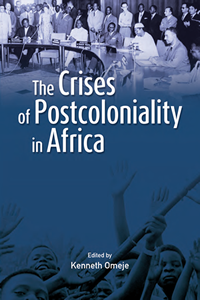The Crises of Postcoloniality in Africa
Synopsis
CODESRIA, 2015, 248p:, ISBN: 978-2-86978-602-8
The Crises of Postcoloniality in Africa is an assemblage of transdisciplinary essays that offer a spirited reflection on the debate and phenomenon of postcoloniality in Africa, including the changing patterns and ramifications of problems, challenges and opportunities associated with it. A key conceptual rhythm that runs through the various chapters of the book is that, far from being demised, postcoloniality is still firmly embedded in Africa, manifesting itself in both blatant and insidious forms. Among the important themes covered in the book include the concepts of postcolonialism, postcoloniality, and neocolonialism; Africa’s precolonial formations and the impact of colonialism; the enduring patterns of colonial legacies in Africa; the persistent contradictions between African indigenous institutions and western versions of modernity; the unravelling of the postcolonial state and issues of armed conflict, conflict intervention and peacebuilding; postcolonial imperialism in Africa and the US-led global war on terror, the historical and postcolonial contexts of gender relations in Africa, as well as pan-Africanism and regionalist approaches to redressing the crises of postcoloniality.
‘In this book, the colonial trope of Africa is subjected to critical analyses from the points of view of postcoloniality. The result is a varied, complex, and interesting exposition of the contemporary challenges and dilemmas of Africa from the many standpoints of postcolonial theory. It makes a useful contribution to our understanding of modern African politics.’
Abdul Raufu Mustapha, Department of International Development, University of Oxford
Chapitres
-
Prelim
-
Debating Postcoloniality in Africa
-
Interrogating Discursive Constructions of African Political History: From the Precolonial to the Postcolonial
-
Africa in World Politics and the Political Economy of Postcoloniality
-
Oil Conflicts in the Postcolony
-
Exploring the Conflicts between Traditionalism and Modernism in Postcolonial Africa
-
Postcoloniality, Conflict Intervention and Peacebuilding in West Africa: Opportunities and Challenges
-
Conflicts and Postcolonial Identities in East/the Horn of Africa
-
Postcolonial Imperialism in Africa’s Maghreb and Sahel
-
The Crises of Postcoloniality in Southern Africa: SADC and Conflict Intervention in Zimbabwe
-
Postcolonial Politics in Kenya
-
Contested Spaces: Gender, Governance and Women’s Political Engagement in Postcolonial Africa
-
Pan-Africanism and the Crises of Postcoloniality: From the Organization of African Unity to the African Union
Téléchargements
Références
African Peer-Review Mechanism, 2005, Base Document, AHG/235 (XXXVIII), NEPAD Secretariat.
African Union, 2000, Constitutive Act of the African Union, Lome, Togo: African Union, 11 July.
African Union, 2002, Protocol Relating to the Establishment of the Peace and Security Council of the African Union, Addis Ababa: African Union.
African Union, 2003, Protocol to the African Charter on Human and Peoples’ Rights on the Rights of Women in Africa, Assembly/AU, Maputo: African Union, 11 July.
Adi, Hakim, and Marika, Sherwood, 2003, Pan-African History: Political Figures from African and the Diaspora since 1787, London: Routledge.
Akokpari, John, Angela, Ndinga-Muvumba and Tim, Murithi, eds., 2008, The African Union and its Institutions, Johannesburg: Jacana.
Bond, Patrick, 2002, Fanon’s Warning: A Civil Society Reader on the New Partnership for Africa’s Development, Trenton, NJ: AIDC.
Centre for Conflict Resolution, 2005, Building an African Union for the Twenty-first Century, Seminar Report 20-22 August, Cape Town, South Africa.
Gomes, Solomon, 2005, ‘The Peacemaking and Mediation Role of the OAU and AU: What Prospects?’, Paper submitted to the Centre for Conflict Resolution (CCR) policy seminar, Building an African Union (AU) for the 21st Century, Cape Town, South Africa, 20-22 August. Integrated Regional Information Network, 2004, Irin News. Office for the Coordination of Humanitarian Affairs, July.
Kajee, Ayesha, 2004, ‘NEPAD’s APRM: A Progress Report, Practical Limitations and Challenges’. South African Yearbook of International Affairs, in A Progress Report published by the South African Institute of International Affairs, Johannesburg.
Maloka, Eddie, 2001, ‘Introduction’, in E. Maloka ed. A United States of Africa?, Pretoria: Africa Institute of South Africa, pp. 1-11.
Mbembe, Achille, 2001, On the Postcolony. Berkeley: University of California Press, 2001.
Mbembe, Achille, 2010, ‘On the Postcolony: Interview with Achille Mbembe’ by Christian Hoeller, Editor of Springerin Magazine, http://www.missingimage.com/node/250676, website accessed on 6/10/10.
Murithi, Timothy, 2005, The African Union: Pan-Africanism, Peacebuilding and Development, Aldershot, England: Ashgate Publishing Ltd.
Musifiky, Mwanasali, 2004, ‘Emerging Security Architecture in Africa’, in Centre for Policy Studies (CPS) Policy Issues and Actors, 7/4, February.
New Partnership for Africa’s Development (NEPAD), 2005, African Post-Conflict Reconstruction Policy Framework, Midrand: NEPAD Secretariat, 29 April.
Nkhulu, Wiseman, 2005, The New Partnership for Africa’s Development: The Journey So Far, Midrand: NEPAD Secretariat, June.
Organization of African Unity, 1963, Charter of the Organisation of African Unity, Addis Ababa: OAU.
Organization of African Unity, 2000, Rwanda: The Preventable Genocide, A Report by an International Panel of Eminent Personalities, Addis Ababa: Organization of African Unity.
United Nations, 1999, Report of the Independent Inquiry into the Actions of the United Nations during the 1994 Genocide in Rwanda, New York: United Nations.
United Nations Conference on Trade and Development (UNCTAD), 2004, Trade Performance and Commodity Dependence, Geneva: UNCTAD, 26 February.






